Survey platforms play a crucial role for businesses. They allow companies to gather direct feedback from customers or employees to understand their satisfaction, identify areas for improvement, and stay on top of their game.
SurveyMonkey is undoubtedly one of the oldest and most popular online survey platforms on the market. However, it isn’t your only option for creating surveys. In this post, we’ll cover some of the best SurveyMonkey alternatives that may better fit your survey needs and price expectations. So, let’s get started!
SurveyMonkey features
SurveyMonkey is a versatile platform offering various features to create, distribute, and analyze surveys. Let’s explore some that make individuals and businesses want to find platforms similar to SurveyMonkey:
- Various question types. Users can design custom surveys using plenty of question types, including multiple-choice, open-ended, Likert scale, and more.
- Pre-build survey templates. The platform offers a library of 180 templates, so there is no need to create your form from scratch. You can choose a pre-made survey to assess customer satisfaction, gather employee feedback, etc.
- Customization options. SurveyMonkey allows users to customize the appearance of their surveys, including branding elements such as logos, colors, and web fonts. In addition, businesses can launch multilingual surveys and craft surveys with branching logic.
- Different distribution channels. Users can share surveys through various channels, including email and social media, or embed them on websites.
- Real-time analytics. SurveyMonkey provides real-time response tracking and monitoring. You can also use text analysis to structure open-ended responses based on frequently used words.
The platform offers top-notch functionality, making it a reliable choice for individuals and businesses seeking powerful survey solutions. However, several cons might make you consider SurveyMonkey competitors.
SurveyMonkey downsides
Based on SurveyMonkey reviews from G2, we’ve curated a list of some frequently mentioned downsides. Here are the top user complaints:
- High cost. Several users express concerns about SurveyMonkey’s pricing structure, stating that it may be more expensive than some competing survey platforms. If you need to scale, the tool can get pretty expensive.
- Limited free plan features. Users have noted that the free plan comes with limitations, making it necessary to upgrade to a paid plan for more advanced features. For example, SurveyMonkey’s free plan restricts the number of survey responses allowed, which may be a drawback for users with larger survey audiences.
- User interface complexity. Some SurveyMonkey reviews state that the user interface is not that intuitive, requiring a learning curve for new users to navigate and fully utilize the platform.
- Lack of advanced functionality. Some users say the service lacks features like block randomization or timer display. While it is a fundamental survey design tool, some reviewers feel it lacks experimental design capabilities.
- Occasional technical glitches. Users have reported survey pages not loading correctly, difficulties in saving changes made to surveys, and instances where survey responses were not recorded accurately. Additionally, a few SurveyMonkey reviews mentioned challenges with the logic and branching features, experiencing unexpected errors or inconsistencies in how logic paths functioned within their surveys.
- Customer support response time. Reviewers have encountered varying experiences with customer support, with some expressing dissatisfaction with response times. There is no phone customer service, even on higher-tier plans, that can get pretty time-consuming, particularly when solving some technical issues.
According to SurveyMonkey reviews on Capterra, users have encountered various technical issues that resulted in failed responses, restrictions due to limited file format support, and potential participants’ disinterest because of the lack of design versatility.
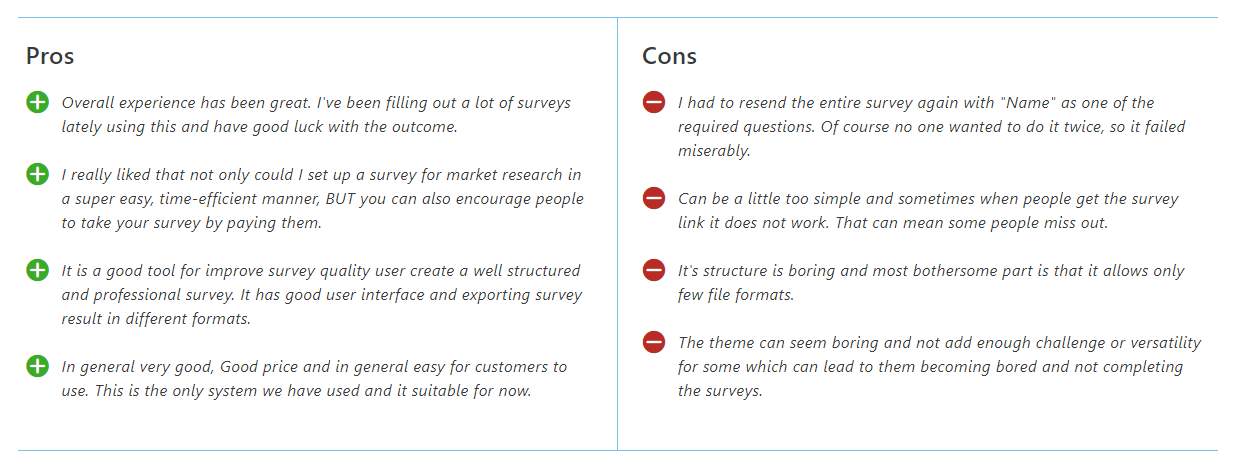 SurveyMonkey reviews on Capterra
SurveyMonkey reviews on Capterra
If any of these complaints is a dealbreaker, read on for our list of potent alternatives to SurveyMonkey, along with the best features and pricing.
Popular SurveyMonkey alternatives
Now, let’s examine the top SurveyMonkey alternatives — some are more cost-efficient, while others cater to specific use cases or offer fewer restrictions on similar tiers.
SendPulse
SendPulse is a versatile solution that equips you with all the essential tools for sales and marketing, including survey pop-ups. The platform allows you to customize its smart widgets and launch website surveys to gather feedback directly from your visitors and improve their user experience. You can choose from many pre-built templates or create your survey from square one.
To interact with website visitors and collect various data types, you can utilize different drag-and-drop building blocks. For instance, a multiselect element can help you gather information on customer product preferences, while dropdown blocks will allow you to collect users’ locations. Besides, there are pop-up flows you can use to create multistep surveys to obtain insights into user satisfaction and identify areas for improvement after customers have completed a specific action or transaction.
The platform also allows you to launch NPS surveys and gather data through stars, emojis, hearts, likes, or another rating display style you think best resonates with your target audience.
 Adjusting an NPS survey pop-up in SendPulse
Adjusting an NPS survey pop-up in SendPulse
SendPulse offers many customization possibilities — you can upload your own visuals, select button colors and alignment, add text and links, change your survey color scheme, and more. With this SurveyMonkey alternative, you can also make your pop-up more dynamic, utilizing various entrance and exit animations. It also offers a wide range of targeting options based on the user’s browsing journey, user’s activity, time spent on your site or specific page, specific period, exit intent, user’s browser language or region, traffic source, etc.
Moreover, SendPulse allows you to reach out to your survey participants since their contact data can automatically be saved to a mailing list or built-in CRM system.
Pricing. SendPulse lets you create up to 5 survey forms for one website for free. Paid plans start from $7/month (billed annually) for more forms and advanced features.
Claspo
Claspo is an on-site conversion platform that helps teams collect high-intent customer input directly on their website through targeted widgets, such as overlays, slide-ins, and embedded forms. Instead of running only long, standalone surveys, you can capture feedback and “why” insights in the moment (on key pages or right after specific actions), when context and intent are highest.
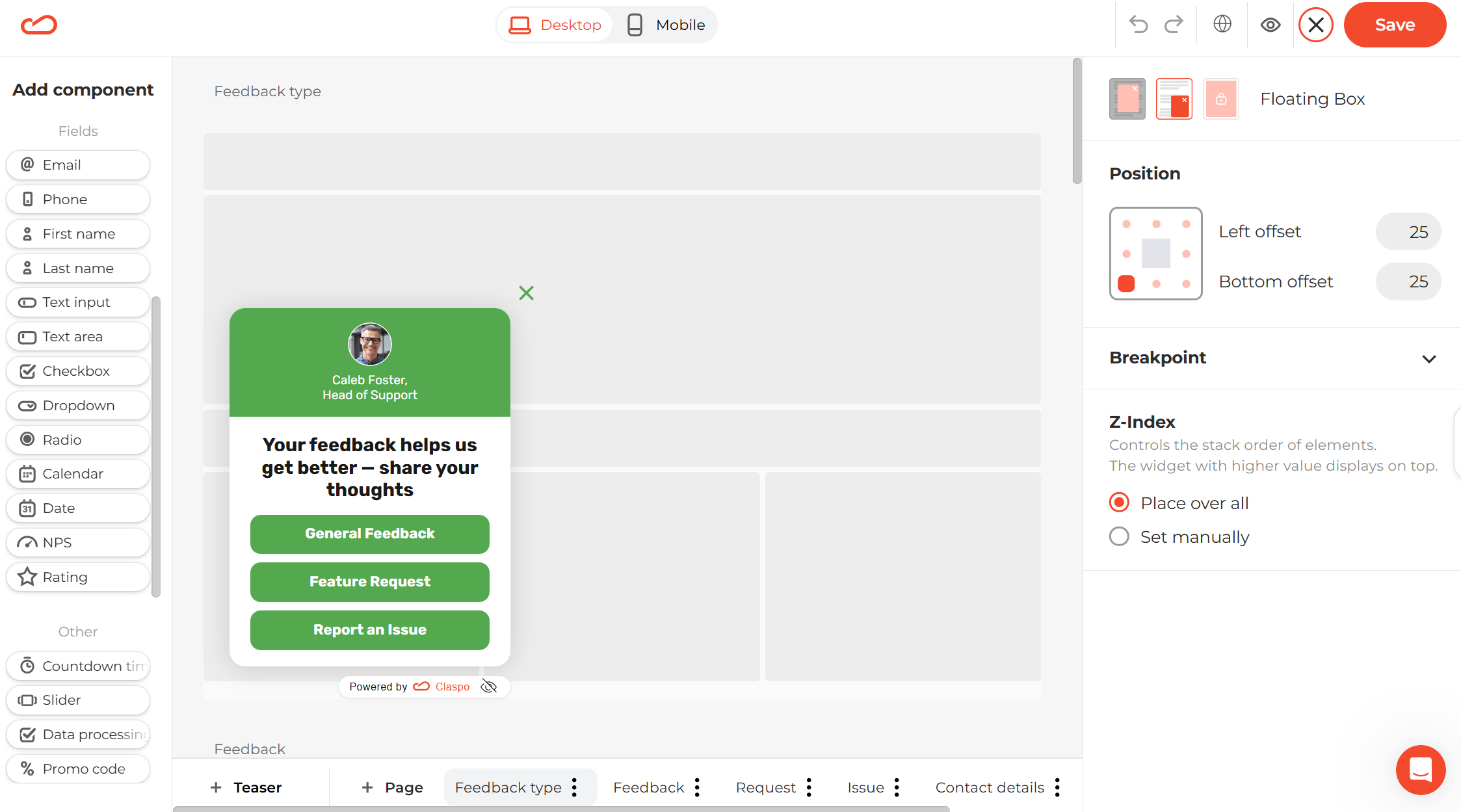 Creating a feedback collection pop-up with Claspo
Creating a feedback collection pop-up with Claspo
With behavior-based triggers and targeting (page rules, scroll, time on page, exit intent), Claspo lets you show the right prompt to the right visitor and segment responses for follow-ups. You can also optimize completion rates using A/B testing and real-time analytics, then send collected data to your existing marketing or CRM stack via integrations (HubSpot, Klaviyo, Mailchimp, Omnisend, Zapier).
Pricing. A lifetime free plan is available. Paid plans are available based on usage and requirements.
Paperform is another great SurveyMonkey alternative that allows users to create online forms and surveys with a sleek design. Apart from collecting feedback, this tool can be helpful for other purposes like appointment bookings and registrations.
Using the platform’s intuitive interface, users can build survey forms that support various question types, including multiple-choice, open-ended, image selection, and rating scales. Paperform also offers features like conditional logic and guided mode with one question at a time, allowing users to create mobile-friendly forms.
The platform lets you pick your color palette, choose a suitable font, create custom thank-you pages, add your visuals, import royalty-free images from Unsplash and Giphy, and so on. To reach an international audience, you can translate surveys created with Paperform.
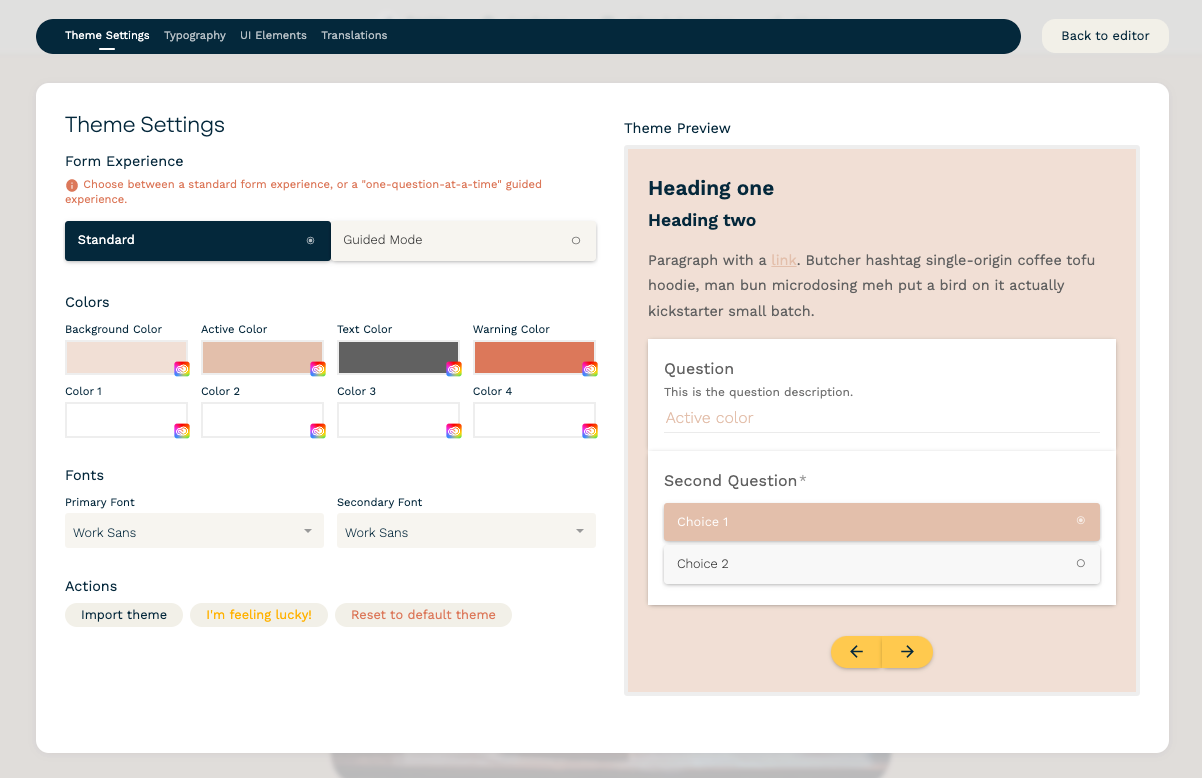 Adjusting the look and feel of a form; source: Paperform
Adjusting the look and feel of a form; source: Paperform
Additionally, the platform facilitates survey distribution across multiple channels — you can embed it on your website, share it on social media, and send it via email. In analytics, you can visualize user behavior, drop-off questions, and general form performance and create personalized reports to share within your team.
Pricing. You can test Paperform within its 14-day free trial. When it ends, you’ll have to choose a paid plan. The cheapest one starts at $24/month, billed annually, and lets you create unlimited forms and get up to 100 submissions.
Alchemer
Alchemer is a powerful alternative to SurveyMonkey designed to help organizations gather, manage, and analyze feedback through surveys and forms.
With this tool, you’ll access an extensive selection of 43 question types, ranging from simple radio buttons to more advanced options like multiple image choice or slider value. These options provide companies with unique insights from their respondents. For instance, max diff can help refine brand messaging based on customer preferences, while conjoint allows determining the optimal pricing strategy by presenting participants with different pricing scenarios and product configurations.
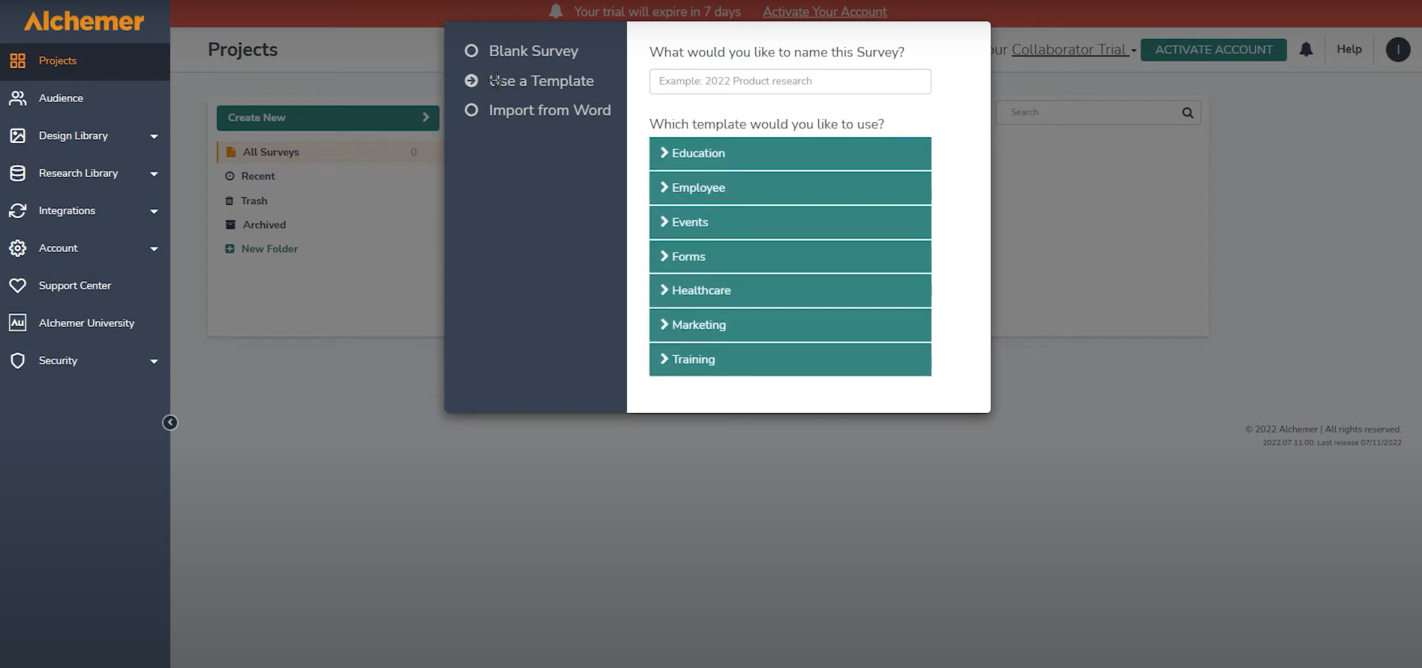 Alchemer’s dashboard; source: YouTube
Alchemer’s dashboard; source: YouTube
Thanks to its intuitive interface, Alchemer offers flexible and customizable reporting, making it easy to access insights. The platform includes filtered, segmented, and longitudinal reports, along with open text analysis, an R script library, and more.
Pricing. Alchemer offers a free plan; you can also request a demo. The cheapest paid plan costs $55/month per user and will allow you to launch unlimited surveys and receive up to 75,000 responses annually.
Jotform is a versatile survey tool known for its user-friendly interface and extensive feature set. This SurveyMonkey alternative allows users to create surveys without any coding skills or technical expertise. The platform offers an extensive library of categorized templates, including different survey types for marketers, healthcare organizations, human resources, and more. Each template is customizable, from colors and fonts to CSS styles and cover images.
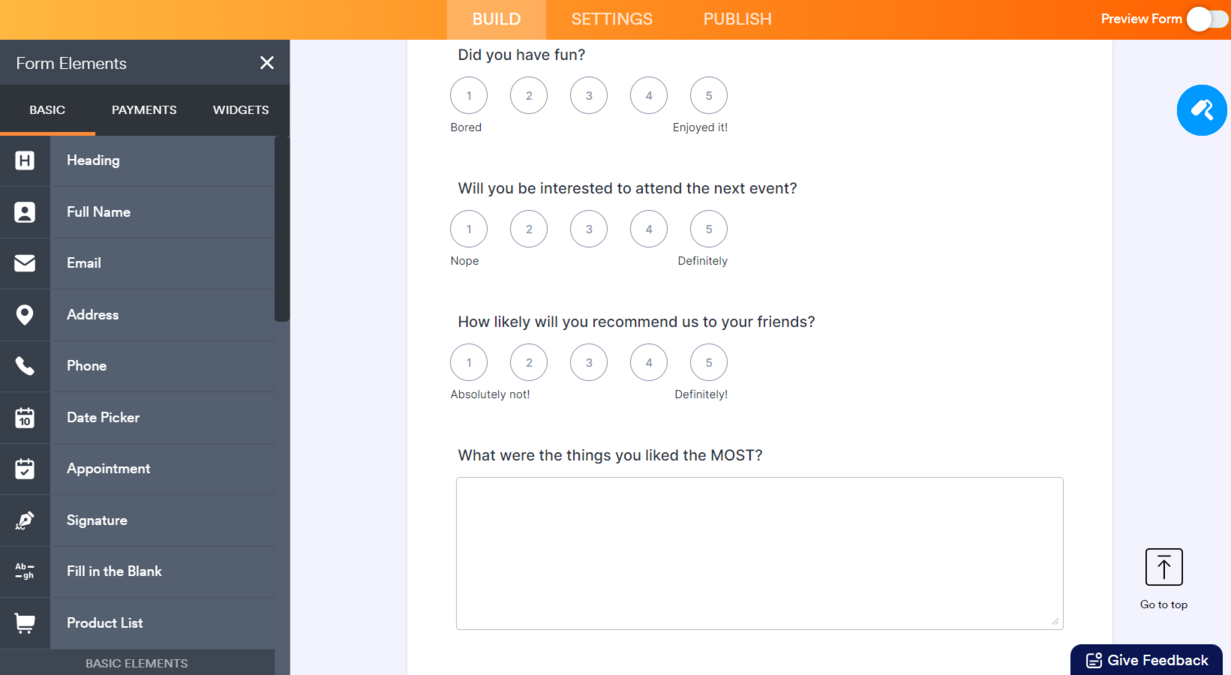 Creating a feedback survey with Jotform
Creating a feedback survey with Jotform
This software also empowers you to create interactive forms with conditional logic so that your website visitors will see the form fields that are relevant to them based on their previous answers.
With its robust reporting and analytics, you’ll gain insights into your customers’ behavior and conversions. You can also see how many people viewed your forms compared to how many responded. Besides, you can seamlessly integrate Jotform with various third-party apps to collect and manage survey data more efficiently.
Pricing. Businesses can utilize Jotform for free and access all features. The free plan allows you to create up to 5 forms with 100 monthly submissions and 1,000 monthly views. The cheapest paid plan costs $34/month and includes 25 forms with 1,000 monthly submissions and 10,000 monthly views. All plans have only one user seat per team.
QuestionPro
QuestionPro is another survey and research platform that helps businesses create online surveys, polls, and forms. This software fits various applications, from academic and market research to employee and customer feedback collection.
This alternative to SurveyMonkey offers 20+ professional survey themes — you can adjust their colors, styling, and fonts or add your logo to the survey header if necessary. The platform lets you design a survey of great flexibility using a wide array of question types. It also supports multi-language surveys, making them accessible to a diverse audience, and provides advanced features like skip logic and branching to enhance the survey-taking experience for respondents.
QuestionPro utilizes AI to analyze responses, allowing you to automatically classify survey feedback as positive, negative, or neutral. Besides, you’ll get access to heat maps, conjoint analysis, trend analytics, etc.
Discover some
powerful AI tools for email, SEO, social media, messengers, and other marketing channels.
Pricing. QuestionPro offers a free plan for one user with a limit of 30 question types and 200 responses per survey. Its paid plan starts at $99/month and allows you to receive up to 25,000 responses annually. You’ll also get access to more advanced features and question types.
Zoho Survey
Zoho Survey is a user-friendly alternative to SurveyMonkey designed to facilitate creating and deploying surveys for various purposes. This tool offers numerous survey design capabilities with over 25 question types and advanced skip logic and piping features to enhance the depth and relevance of survey responses. For instance, using piping, you can address respondents by name, present different scenarios or questions based on respondents’ previous answers, or customize closing messages based on their inputs.
You can create a survey in Zoho’s drag-and-drop builder or choose from over 200 pre-made templates and fine-tune them to meet your needs — personalize your survey style, adjust every element of a survey form, add a logo, etc. With Zoho Survey, you can translate and edit your survey in over 30 languages to reach a broader audience. In addition, you can set custom variables to track your respondents’ data more efficiently.
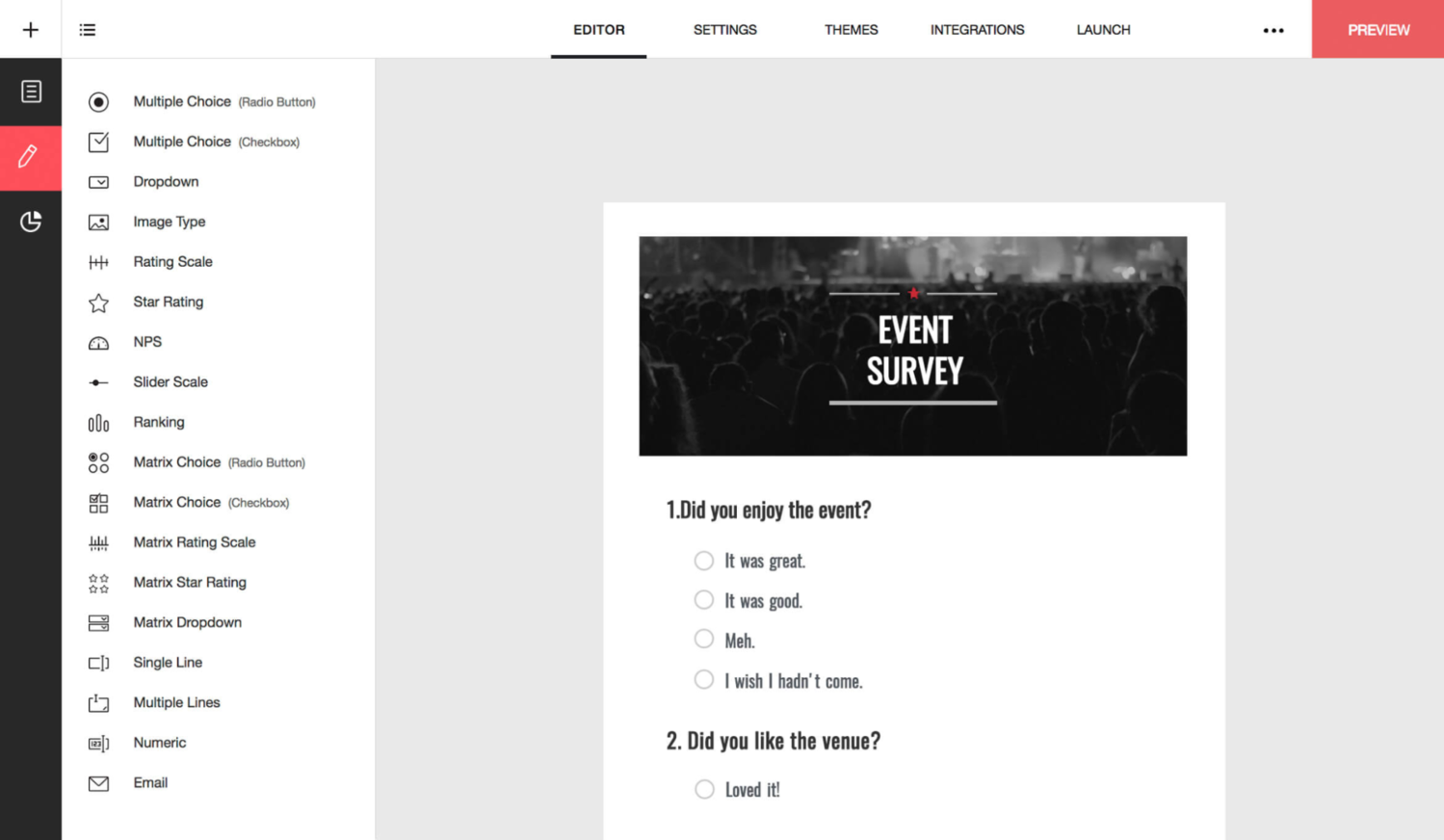 Creating a multiple-choice survey in Zoho builder; source: Zoho
Creating a multiple-choice survey in Zoho builder; source: Zoho
Another standout feature of Zoho Survey is its real-time analytics dashboard, allowing users to track and analyze survey responses immediately upon submission. Besides, the software lets you filter responses, create custom reports, and view relevant metrics through charts and graphs.
Pricing. Businesses can start with Zoho Survey for free. It includes unlimited surveys, 10 questions per survey, and 100 responses. Zoho’s cheapest paid plan costs $27/month and provides unlimited questions, 3,000 responses, along with some advanced features.
Survicate
Survicate is another tool similar to SurveyMonkey for companies to collect valuable feedback and insights from their target audience. It offers a range of features to create and distribute surveys across various channels, analyze responses, and make data-driven decisions. You can get in touch with your audience and gather their feedback via email, on your website, or in your mobile app.
This platform enables users to build any survey using its intuitive drag-and-drop builder and add various question types, including multiple-choice, open-ended, rating scales, and more. Besides, you can choose one of the 400 Survicate templates. The platform also allows you to customize your surveys to match your brand image and translate them into different languages to reach customers in their preferred language.
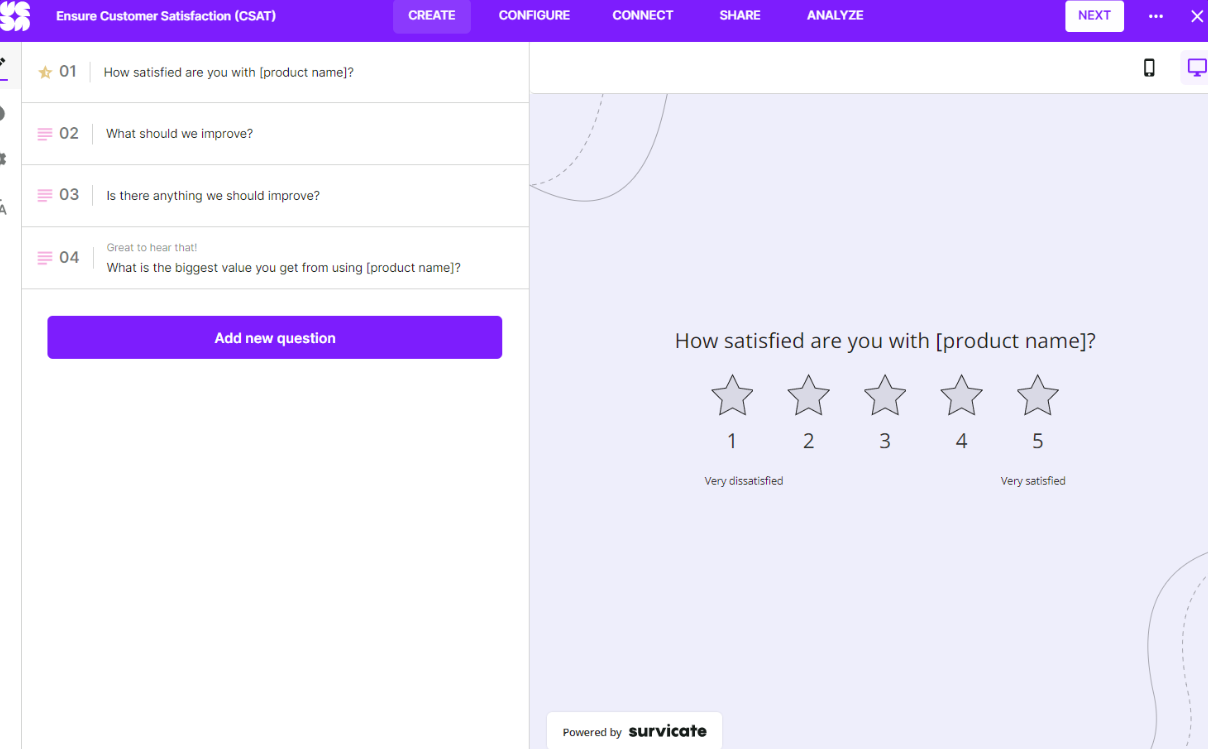 Adjusting a survey template; source: Survicate
Adjusting a survey template; source: Survicate
This SurveyMonkey alternative stands out for its real-time reporting capabilities, targeting, and triggering options. Besides, users can integrate Survicate with third-party analytics tools to get a comprehensive data view.
Pricing. You can test the platform for 10 days. When your free trial ends, you’ll have to choose one of the paid plans starting from $53/month, billed annually.
SurveyLab
SurveyLab is a survey solution that can be a great alternative to SurveyMonkey for some users. This software offers a high level of customization in terms of survey design, branding, and themes. Additionally, it provides various question types, allowing for more detailed and nuanced responses.
An excellent feature of this service is that it automatically detects the device type a person is using and scales your survey to fit it. It means there’s no need to create separate versions of your form for desktop and mobile users. SurveyLab’s support for multiple languages is another advantage for companies targeting a global audience. Furthermore, the tool allows you to create multichannel surveys.
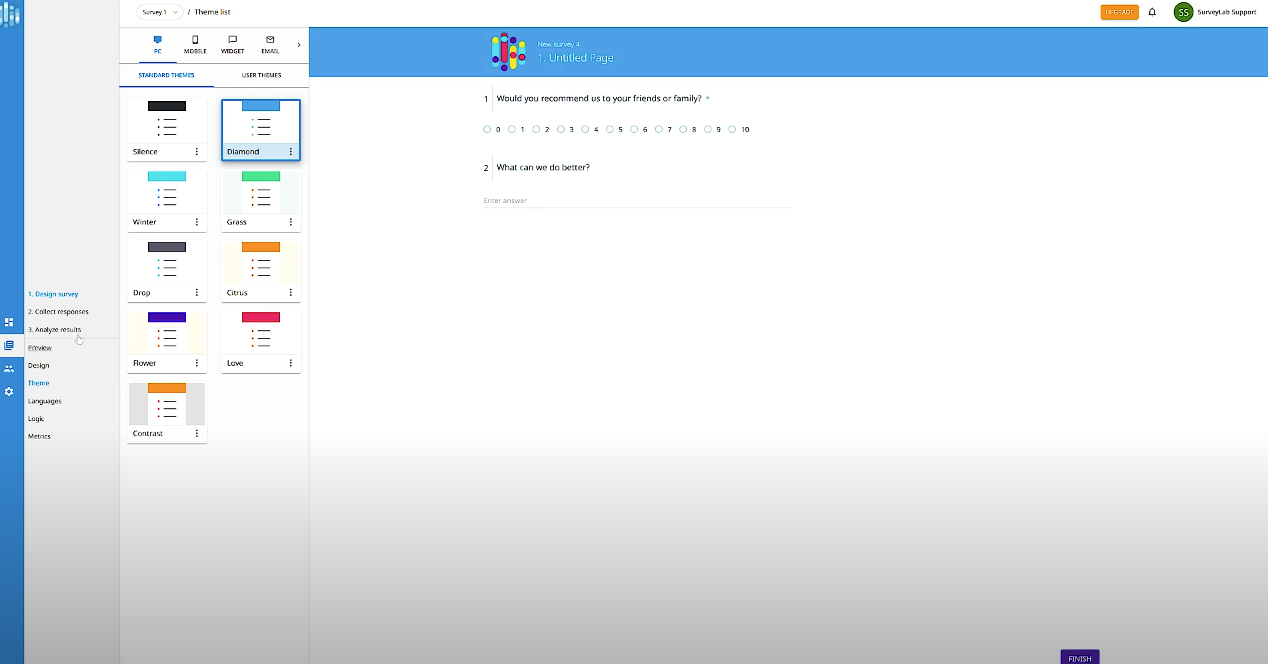 Designing a survey with SurveyLab; source: YouTube
Designing a survey with SurveyLab; source: YouTube
When it comes to reporting, SurveyLab helps you collect and manage all the responses in one place. Its real-time automated survey reports enable you to initiate analysis immediately upon survey launch. Moreover, you can utilize different filters to analyze the feedback effectively.
Pricing. Upon registration, you can test the software within its 14-day free trial. Afterward, your account transitions to a free plan with the 50 responses/month restriction. The cheapest paid plan costs $40/month, billed annually; it includes 1,000 monthly responses, multichannel surveys, report filters, and other features.
LimeSurvey
LimeSurvey is another alternative to SurveyMonkey on our list, offering robust features and an open-source nature. Unlike other survey platforms, LimeSurvey allows users to host the software on their servers, which ensures complete control over survey data and security.
This platform is highly flexible and enables extensive survey customization. It provides 28 question types, templates for different niches, and advanced survey logic. Users can design polls and surveys for customer satisfaction, market studies, or employee feedback. LimeSurvey also has multilingual capabilities, allowing users to create surveys in different languages. Another notable feature is its ability to support offline survey participation.
LimeSurvey provides robust reporting features, allowing users to thoroughly analyze survey results. The platform also offers various visualization and export options for further analysis.
Pricing. With LimeSurvey, you can get started for free and upgrade to a paid plan later on. The cheapest paid plan costs $31/month, billed annually, and covers unlimited surveys and questions. However, it is limited to 1,000 responses per month.
Typeform is a versatile form-building tool that allows users to create interactive and engaging forms, surveys, and quizzes. The platform can be used for different purposes, such as collecting feedback or generating leads.
This SurveyMonkey competitor uses a conversational format, allowing you to present questions one at a time. Typeform provides customization options for themes, fonts, and colors, letting users align the survey design with their brand or desired aesthetics. With Typeform’s Hidden Fields, you can put data that you already have directly in your survey URL. This way, you can address responders by name and incorporate personalized follow-up questions to make an interaction more personal.
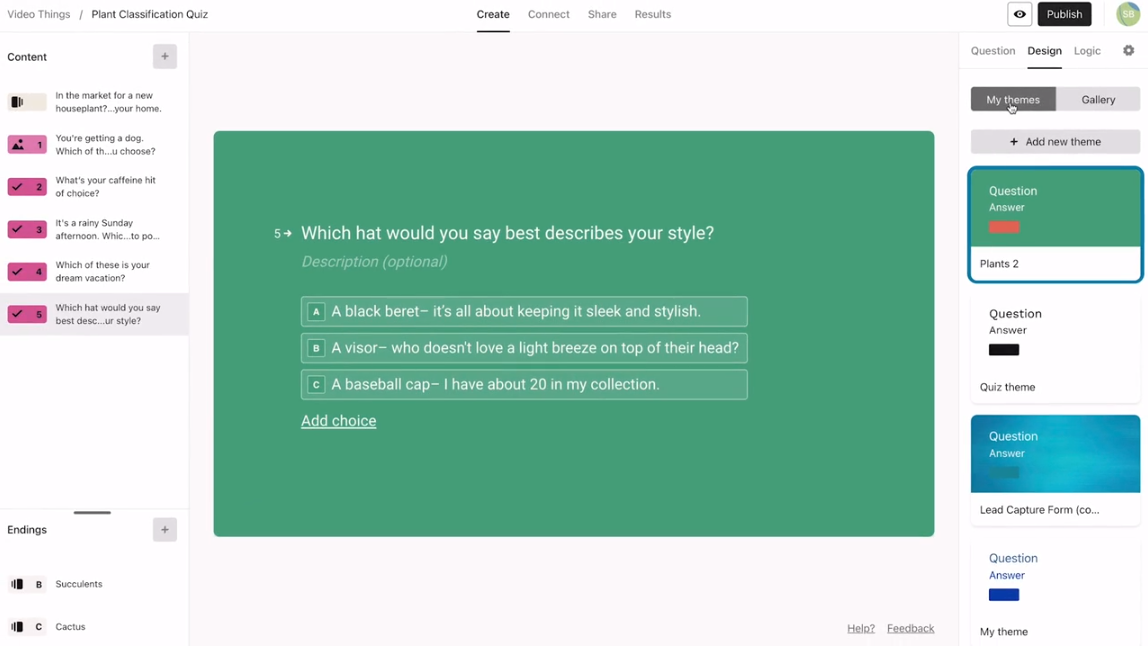 Creating a survey form with Typeform; source: Typeform
Creating a survey form with Typeform; source: Typeform
With this tool, you’ll access over 3,000 templates and 28 editable question types, including multiple-choice, yes-or-no, long text, short text, and so on. You can also use Typeform AI to co-create and refine your forms. To distribute your survey, you can share its link on social media, emails, or landing pages.
Pricing. Users can start with Typeform’s free plan, which includes unlimited forms, 10 questions per form, and 10 monthly responses. The cheapest paid plan costs $23/month, billed annually, and covers 100 monthly responses. However, this tier is suitable for smaller teams, as it only includes one user.
Google Forms is a web-based application that enables users to create online forms for various purposes. You can launch surveys, quizzes, event registrations, and feedback forms and customize them by adding different questions. When creating a form, you can rearrange questions simply by drag-and-dropping, set point values via the answer key, or pre-fill your survey with default values. In Addition, Google Forms allows you to personalize the appearance of your survey by adjusting colors, images, and fonts.
Thanks to integrated AI, marketers can set validation rules for responses. For instance, this will ensure that email addresses are correctly formatted or numbers fall within a specific range. It also offers various sharing options, allowing users to distribute surveys via email, social media, or by embedding them on websites.
With this free SurveyMonkey alternative, you can set specific conditions to display corresponding questions based on certain responses. A notable advantage of Google Forms is its seamless integration with other Google Workspace applications, enabling users to collaborate in real time and easily access collected data through Google Sheets.
Pricing. Google Forms is free to use without restrictions on the number of forms, questions, or responses. However, a free Google account offers 15 GB of storage for surveys and documents.
SurveyKing
SurveyKing is a survey tool designed to help individuals or organizations create and distribute forms for various purposes. Equipped with a user-friendly drag-and-drop builder, this platform lets users seamlessly add and customize questions.
This SurveyMonkey competitor allows you to capture unique insights from respondents thanks to diverse question types, like Maximum Difference Scaling (MaxDiff), Conjoint, Van Westendorp, and Gabor Granger. For example, with MaxDiff, you can identify respondent preferences by selecting the most and least preferred options, while Conjoint analysis helps you assess how product attributes influence overall preference. Businesses can also monitor their NPS, identify problem areas, or conduct market research for new products.
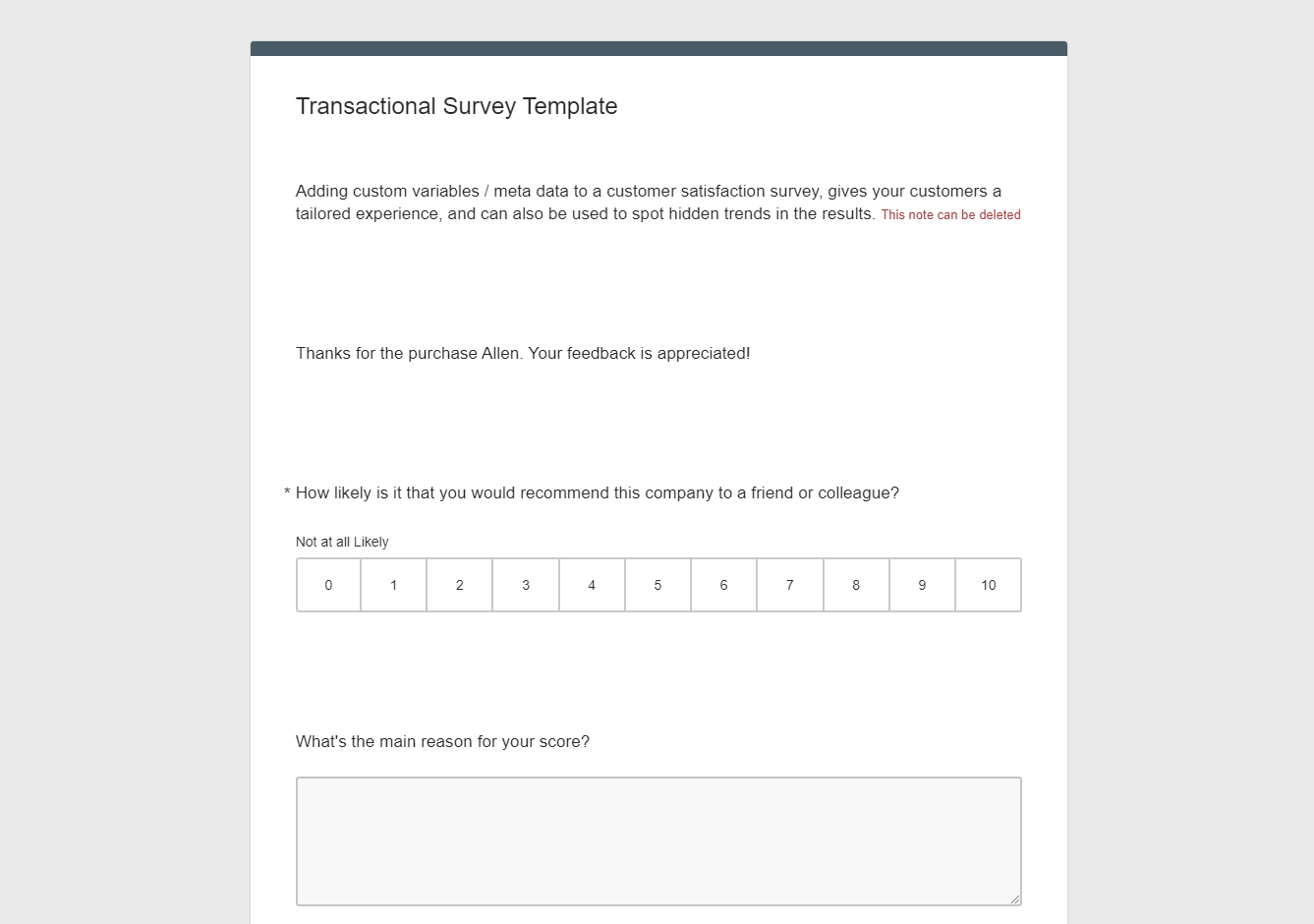 A survey template preview
A survey template preview
Besides, SurveyKing stands out as the survey platform that provides k-anonymity, keeping respondents’ identities confidential. Anonymous surveys feature a seal with an info link to encourage respondents to provide honest feedback, making SurveyKing a perfect solution for running employee surveys.
Pricing. SurveyKing offers a free plan with unlimited surveys and questions but a restriction of viewing up to 30 responses. It also includes skip logic and piping features. With the cheapest paid plan for $19/month, you can view up to 2,000 responses and use all question types without any limits.
Sogolytics
Sogolytics, also known as SoGoSurveys, is an experience management platform designed to facilitate the collection of feedback to help you understand your customer and employee experiences. This alternative to SurveyMonkey allows you to create online surveys using its step-by-step editor. All you need to do is choose a preferred question type, personalize the appearance of your survey, and incorporate interactive features if required. Later on, you can connect with participants using a variety of distribution channels, such as email, social media, websites, etc.
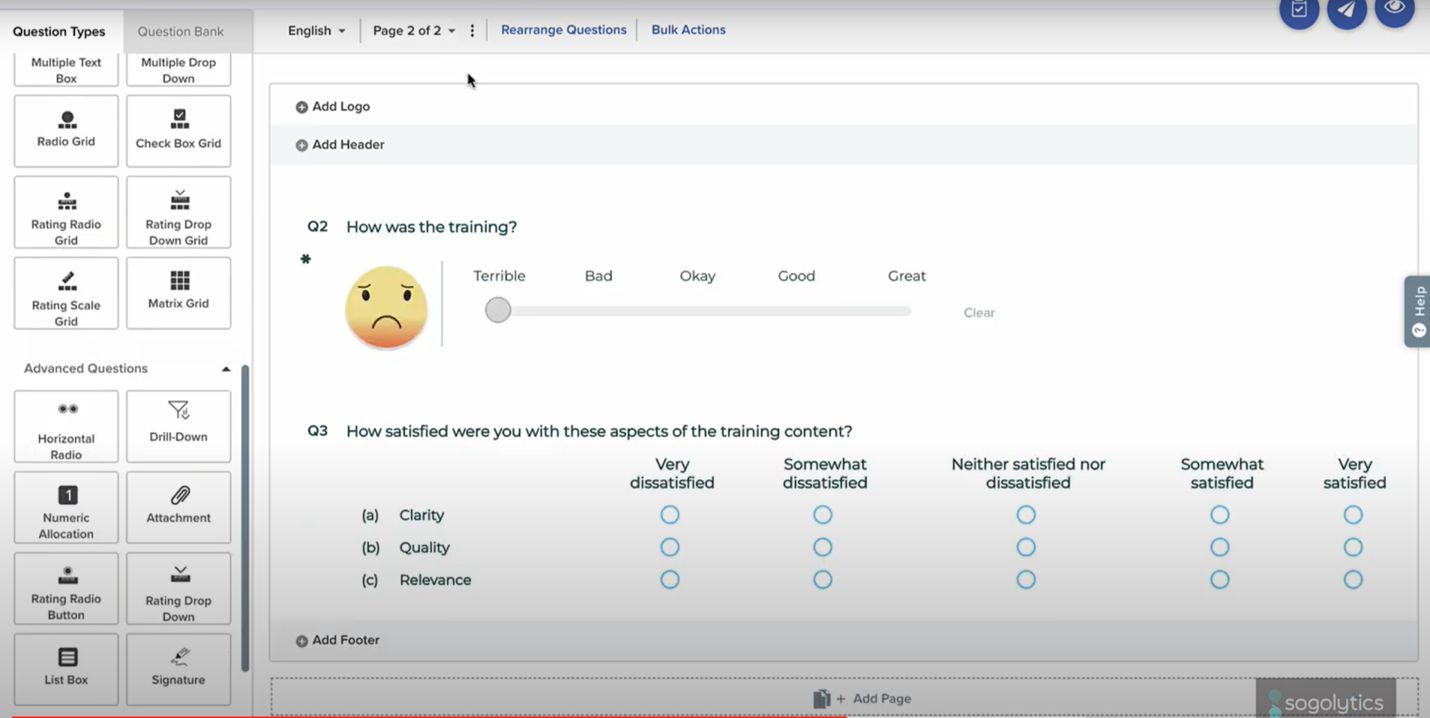 Creating a survey with Sogolytics; source: YouTube
Creating a survey with Sogolytics; source: YouTube
You can select from different types of charts and tables for a quick snapshot of results or delve into answers with robust filtering and segmentation. As to open-text responses, you can analyze insights using sentiment analysis and visual representations like word clouds. Besides, the service lets you share live reports with your teammates across other platforms, even if they don’t have a Sogolytics account.
Pricing. Sogolytics provides a free plan that includes up to 15 surveys and 500 questions per survey. The most affordable paid plan, at $25/month, gives you access to unlimited surveys and 998 questions per survey. If you need additional customization and flexibility capabilities, you might need to upgrade to a higher-tier plan.
SurveySensum
SurveySensum is a customer experience management platform that uses AI to create surveys and provide meaningful insights from the collected data. It is a free alternative to SurveyMonkey, offering built-in templates for various types of surveys, including NPS, product, onboarding, and pulse surveys. Besides, you can make your surveys more interactive using hiding screens, piping, skip logic, randomized options, etc.
The user-friendly interface lets you quickly launch a survey by selecting a template and setting up branding elements. You can upload your CSV file to share your survey. SurveySensum also lets you set up automated reminders for non-responders.
With AI-enabled text analysis, businesses can extract quantitative insights from data; the SurveySensum dashboard consolidates NPS scores, NPS behavior, customer sentiments, and key trends in a single view. You can also customize reports by applying data filters.
Pricing. There is a free plan that includes 25 responses per month, along with unlimited surveys, questions, and users. You can also choose a pay-as-you-go model — for 250 responses, you’ll have to pay $99/month, billed annually.
SmartSurvey
SmartSurvey is a user-friendly SurveyMonkey alternative for creating online surveys, web forms, and questionnaires while tracking real-time results. It offers customizable templates with various question types to help you create a survey according to your needs. You can also add multimedia, such as images, audio files, and videos, to your surveys and translate them into different languages.
SmartSurvey has features like a progress bar, page numbering, and the “save and continue” option, which allows respondents to save their progress and continue later. To reduce response bias, you can also randomize the order of your survey questions or answers.
SmartSurvey comes with built-in distribution options, making it easy for businesses to reach their target audience. You can share your surveys through links or embed them on your website and monitor responses in real time.
Pricing. SmartSurvey offers a free plan with unlimited surveys, 15 questions per survey, and 100 responses per month. The cheapest plan costs $38/month and includes unlimited surveys, questions, and responses and advanced features like skip logic or question randomization.
Formstack is an online survey builder similar to SurveyMonkey. It is designed for individuals and organizations wanting to create and evaluate web surveys for different purposes besides customer feedback.
The platform has various features that optimize the gathering of valuable customer input. For example, “Partial Submissions” can be helpful for longer surveys since the platform automatically saves the entered data, ensuring that respondents can pick up where they left off. The “Field Bottlenecks” option provides insights into which form fields cause delays or confusion, enabling you to optimize form design to address those challenging fields. There are also “One Question at a Time,” conditional logic, and data encryption features.
Formstack’s robust analytics allow you to monitor unique views, conversions, and abandonment rates from those filling out your form.
Pricing. Formstack offers a 14-day trial, but you should select a paid plan to continue using the platform. The most affordable one starts at $50/month and allows you to create up to 20 forms per account, receive 1,000 submissions per form, and utilize custom theme design capabilities.
The bottom line
Conducting surveys is crucial for identifying areas that need improvement. While SurveyMonkey stands out as a popular choice for this purpose, plenty of other options exist.
Whether you are looking for a SurveyMonkey alternative due to pricing, customization requirements, customer support, or other reasons, here’s a quick recap of the platforms covered in this post:
| Platform |
Free plan |
Starting price per month, billed annually |
Usage limits on the cheapest paid plan |
Best features |
| SendPulse |
+ |
$7 |
5 forms |
Advanced targeting options |
| Claspo |
+ |
$29 |
50,000 monthly pageviews |
Nuanced display conditions |
| Paperform |
– |
$24 |
100 responses/month |
Quizzes and payments |
| Alchemer |
+ |
$26 |
75,000 responses/year |
Advanced survey logic and branching |
| Jotform |
+ |
$34 |
25 forms, 1,000 responses/month |
Custom PDF documents based on form responses |
| QuestionPro |
+ |
$99 |
25,000 responses/year |
Maxdiff and Conjoint analysis question types |
| Zoho Survey |
+ |
$27 |
3,000 responses/month |
Survey distribution and management automation options |
| Survicate |
– |
$53 |
250 responses/month |
Contextual surveys |
| SurveyLab |
+ |
$40 |
1,000 responses/month |
Multichannel and multilingual surveys |
| LimeSurvey |
+ |
$31 |
1,000 responses/month |
Offline survey capabilities |
| Typeform |
+ |
$23 |
100 responses/month |
Conversational logic |
| Google Forms |
+ |
Free |
No limitations |
Integration with Google Workspace applications |
| SurveyKing |
+ |
$19 |
2,000 responses/month |
Advanced survey techniques |
| Sogolytics |
+ |
$25 |
998 questions per survey |
Real-time reporting and analytics |
| SurveySensum |
+ |
$99 |
250 responses/month |
Multilingual capabilities |
| SmartSurvey |
+ |
$38 |
15 questions per survey, 100 responses/month |
Question and answer randomization |
| Formstack |
– |
$50 |
20 forms, 1,000 responses per form |
Conversion rate optimization tools |
Selecting the right tool can be challenging initially, so it’s advisable to test a platform first. SendPulse, with its free plan and affordable paid options, provides a genuine advantage, especially in terms of scalability. Give it a try today!